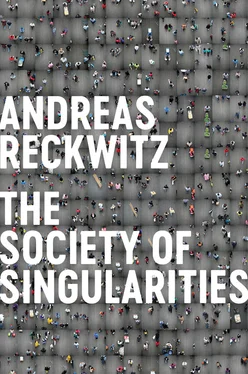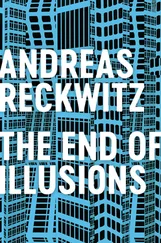1 ...7 8 9 11 12 13 ...30 Finally, the normative rationalization of modernity involves the targeted regulation of intersubjective orders, characteristic of which is modern law with its origins in discursive arenas and its use in government administration. In a strict sense, it can have a normative or normalistic form. 13Here the practice of the general is one of formalization . In law, the most general possible rules are established, and entirely deducible systems of rules are put in place in order to guide (and, if necessary, correct) individual acts of social behavior. On the one hand, the intention of modern law is to make activity predictable and transparent; on the other hand, however, it is also meant to convey the conviction of a regulated order in which equal things are treated equally and unequal things are treated unequally. Law, and with it the entire normative rationalization of modernity, which also encompasses non-judicial areas of civilian interaction and moral behavior, is intended to make social interactions predictable and reciprocal. Law and normative rationalization require fundamental legal equality, but they also require the psychological uniformity of subjects, who are expected to be self-responsible and follow norms.
As the three forms in which the rationalistic logic of the general operates and enacts generality, standardization, formalization, and generalization have been interconnected with one another since the end of the eighteenth century, and they have made the modern world what it is. Together they have had several consequences: they have lent relatively high levels of predictability, order, and transparency to the social, thus making it seemingly easier to foresee and plan. This logic goes hand in hand with the interchangeability of subjects, who are the primary bearers of functional roles, so that the functionality of subject positions can be independent of personalities, membership in a given family, or group affiliations. Moreover, the social logic of the general reduces the level of emotional intensity that is integral to the social. It leaves no room for participating in a given practice for its own sake, but rather only as a means to a (further) end – for instance to achieve greater efficiency, establish dominion over nature, or coordinate behavior in a more transparent manner. The reification that arises from the generality of these rules is thus associated with controlling and reducing affect. Here, the mode of social practice is not emotional engagement but rather the emotionally distant following of rules. Even moral rules are to be abided by out of duty and not out of inclination. 14In modernity, the social logic of the general ultimately tends toward the ideal of the universal, toward that which is valid for everyone at all times. Even if this universalism is not achieved everywhere – on account of the restrictions of national states, for instance – it remains the ultimate goal of generalization. 15
Objects, Subjects, Spaces, Times, and Collectives in the Social Logic of the General
The social logic of the general, which goes hand in hand with formal rationalization, affects all aspects of the social. The term “social logic” is thus related to a comprehensive way of structuring things that encompasses the practices of observation, evaluation, production, and appropriation discussed above, and also includes every social entity. In an analogous way, this will also be true of the social logic of singularities. The credibility of a given social theory generally depends on its ability to make statements about all elements or entities of society. 16From my perspective, it is possible to distinguish (at least) five entities of the social that are formatted in a particular way by a social logic: objects, subjects, spaces, temporalities, and collectives. In other words, the social world consists of social practices in which subjects and objects participate, from which collectives are formed, and which structure time and place in a particular way. And in the classical version of modern society, all five entities are the object of “enacted generality.”
For objects (including things ), this means that they are produced to be identical (that is, as unending replicas of the same) or “more of the same” (that is, as variations of the same thing). 17They are interchangeable. The prime example of this is the industrially manufactured product, which customers use or consume in a standardized way. If there are any differences between the objects, this is a matter of gradual differences in usefulness, performance, or suitability that nevertheless satisfy general and objective standards. In this regard, even semiotic objects such as texts and images can be regarded as contributions to the general – namely, to general information. Here the objects remain stable even when they circulate: they are always the same (they do not have any cultural biography), and at most they will show no more than a few signs of wear over time. They are rational artifacts that have instrumental relevance in the manner of a tool; they are a means to an end that vanishes as soon as its purpose has been fulfilled or the means itself is no longer suitable. Beside the commodity, accordingly, the second main example of general objects is the machine. A machine is not only produced in identical copies; it also produces identical copies of goods. As an object type, the machine is a general piece of infrastructure for fabricating the general.
We now come to subjects , who are produced within the framework of classical modernity “doing generality” and also form themselves in this context. They are all trained to have the same competencies and to exhibit identical, or at least similar, manners of behavior. The competencies and activities of subjects here contribute to formal rationality. One model for such a general subject is a type of character driven from within by a sense of morality or utilitarianism – a character that accordingly follows a set of principle or acts according to cost–benefit analyses. Another model is the “socially adjusted person,” who strives to meet intersubjective expectations and to be “normal” or “average” (in the non-pejorative sense). 18The first model implies a static and stable sort of uniformity, while the second entails a dynamic sort of uniformity that is always readjusting to new social demands. In both cases, the subject becomes an object of social discipline. Any deviation from the standard is thus sanctioned for seeming abnormal.
Within the framework of classical modernity, of course, there are also subjects with special characteristics. Such cases are not examples of singularities in the strict sense, however; they are rather instances of the general-particular – that is, they represent differential positions within the framework of a general order. 19This was typically a matter of either differences in specialization or gradual differences in performance. Subjects are encouraged to develop specialized competencies and roles. Above all, within a given set of professional qualifications, these activities are standardized and aligned to suit different sorts of jobs. While engaged in professional (or educational) activities, subjects in classical modernity are in turn evaluated according to what is called their achievement. The latter involves systematic differences that can be measured against a general and “objective” standard, either according to a qualitative scale of better or worse (the classic example being grades in school) or according to a quantitative scale of more or less (the classic example being production targets). In other words, the social logic of the general also allows for “individualism,” but it is defined by every subject having the same rights and obligations, behaving in the same self-responsible manner, and fulfilling his or her duties and requirements in the same way. In the social logic of the general, “individualization” thus presents itself as individual differences in achievement along prescribed scales of evaluation. 20
Читать дальше












